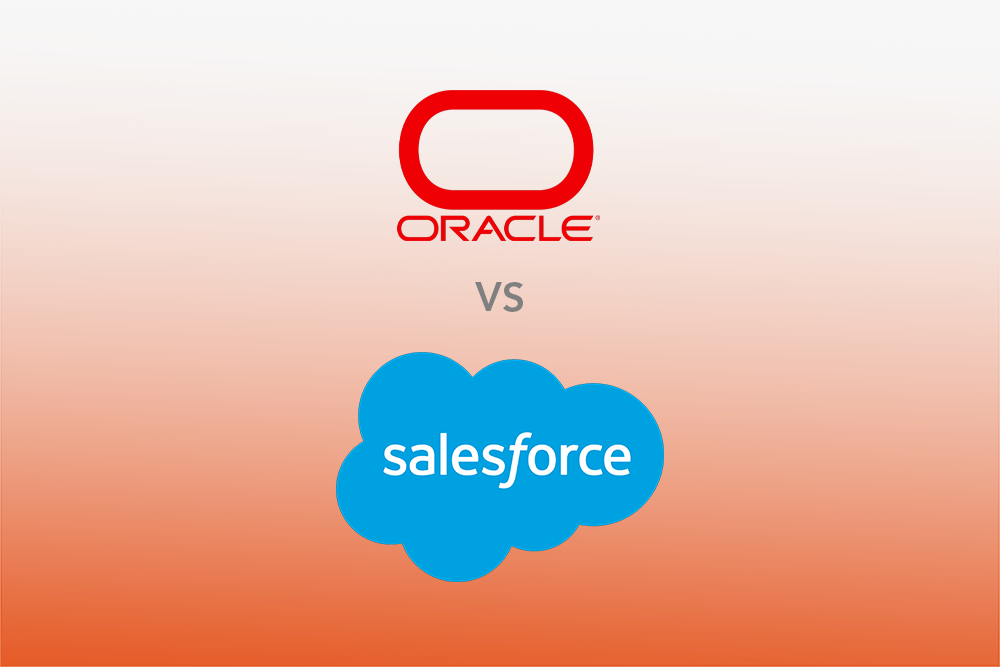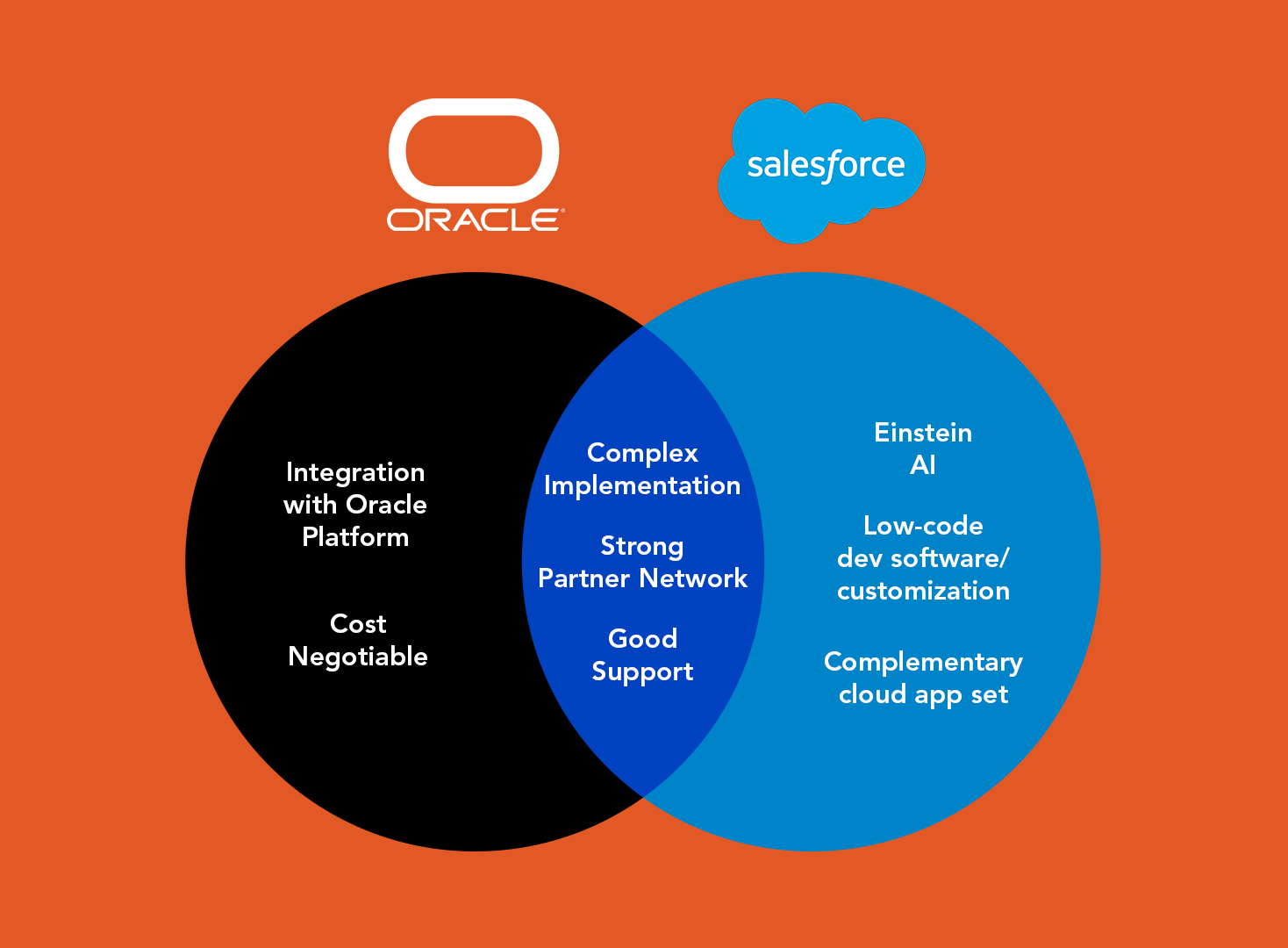
In the world of customer relationship management (CRM), two giants dominate the market: Oracle and Salesforce. According to a report from Gartner, Salesforce holds a 19.5% share of the CRM market, while Oracle comes in at 5.8%. [Source: Forbes]
Despite the disparity in market share, both offer unique advantages for different business needs. But which CRM is the best fit for your company? Here's a detailed Oracle CRM vs Salesforce guide to help you.
In this blog, we will talk about the features and overall value of Oracle CRM vs Salesforce CRM. We'll also explore the pros and cons of each platform and guide you toward the right choice for your business.
Oracle CRM is part of the Oracle Cloud suite, designed for businesses to streamline sales, marketing and customer service. The Oracle CRM allows you to manage and analyze data, automate marketing efforts, and improve sales performance. It has deep integration with other Oracle services, such as ERP and HR software.
Oracle CRM can also integrate with other Oracle solutions like the Oracle Siebel CRM and Oracle E-Business Suite. This provides a unified experience across all business processes, from finance to HR and supply chain management. Moreover, Oracle can be tailored for various industries to meet specific needs.
While Oracle CRM is feature-rich, it may not be as user-friendly or as flexible as some competitors. The platform can be complex to implement and may require dedicated IT support. Thus, it's more suitable for businesses with larger, more specialized teams.
Salesforce is a one stop shop for businesses when it comes to sales, marketing and business management. This cloud-based solution improves and tracks customer interactions, sales pipelines and marketing campaigns. Moreover, Salesforce CRM has several tools to streamline sales processes and enhance productivity. These include lead and opportunity management, automated workflows, and detailed analytics.
Salesforce also offers advanced AI-powered features through its Einstein platform. Additionally, there's the AppExchange, a marketplace for third-party applications. So, Salesforce users can easily connect the platform with over 5,000 integrations available. This includes platforms like Google Drive, DocuSign, MailChimp and Slack. This flexibility makes Salesforce a great option for businesses with an extensive ecosystem.
Additionally, Salesforce is known for its ease of use and customization options. Its drag-and-drop interface and low-code development doesn't require extensive technical expertise. Salesforce also offers excellent customer support so users get the help they need when they need it.
Here’s a quick glance at the key similarities and differences between Oracle Siebel CRM vs Salesforce:
Salesforce is renowned for its powerful integration capabilities. As stated earlier, it connects with thousands of other apps to optimize workflows across businesses. The best Salesforce integration tools are:
Oracle’s integrations are also robust but have some differences from Salesforce. Key Oracle integrations include:
In the debate of Oracle CRM vs Salesforce CRM, Salesforce wins when it comes to third-party integrations. However, Oracle excels when businesses are using Oracle’s suite of products. This allows for seamless integration across various Oracle services.
Now, let’s take a quick look at what kind of support and resources are available for both. Here’s a comparison of Oracle Crm Cloud vs Salesforce customer support:
Salesforce offers an all around support system with tiered plans based on product and licensing levels. These plans include:
Oracle provides tiered support options as well:
Overall, in the Salesforce CRM vs Oracle CRM support, both platforms offer comprehensive service. Salesforce provides more user-friendly options, including free learning resources like Trailhead. But Oracle University has better tools and courses for sales professionals.
Choosing between Oracle CRM vs Salesforce CRM ultimately depends on your company’s specific needs, budget, and scale. Here are a few factors to consider:
In the Salesforce vs Oracle battle, we have a clear winner. While both platforms provide excellent features, Salesforce is the preferred choice. It has extensive tools, powerful AI features and much more.
Overall, both Oracle and Salesforce offer powerful tools but the right choice depends on your team’s needs. If you're looking to get started quickly with an easy setup, Salesforce is the way to go, thanks to its simple sign-up process. However, if your company already uses Oracle products, Oracle Sales Cloud might be a better fit.

Salesforce CRM is clearly ahead of Oracle CRM, with higher ratings and more customer satisfaction. Also considering all the above mentioned factors, Salesforce CRM tends to be a better option. Here are a few other reasons why Salesforce takes the upper hand:
In the ultimate showdown of Oracle CRM vs Salesforce CRM, Salesforce emerges as the better choice. It's the one if you're looking for flexibility, ease of use, and robust integration options. After all, there's a reason why Salesforce has been the #1 CRM platform in the market for many years now.
At PixelConsulting, we help companies navigate CRM solutions and choose the best option for their needs. We will help you implement Salesforce in a way that works for your business. Our team of experts is here to guide you every step of the way. Let us help you unlock the full potential of Salesforce CRM.
Reach out today to get started!
No, Salesforce was never owned by Oracle. However, there is a connection between the two companies. Salesforce was founded in 1999 by Marc Benioff, who previously worked at Oracle as a senior executive. While Benioff took inspiration from his time at Oracle, Salesforce was built as a completely independent company. Oracle and Salesforce remain competitors in the CRM space, but Oracle has never owned or controlled Salesforce.
No, Oracle’s Professional Edition starts at $65 per user per month and its Premium Edition can go up to $300 per user per month. On the other hand, Salesforce CRM starts at just $25 per user per month, making it the cheaper option for businesses.
Salesforce has many strong competitors but the biggest one is Microsoft Dynamics 365. Microsoft has a CRM and ERP solution that integrates with other Microsoft products like Office 365 and Azure. Other major competitors include Oracle and SAP, providing enterprise-level CRM and business solutions.
Read Also : Salesforce CPQ